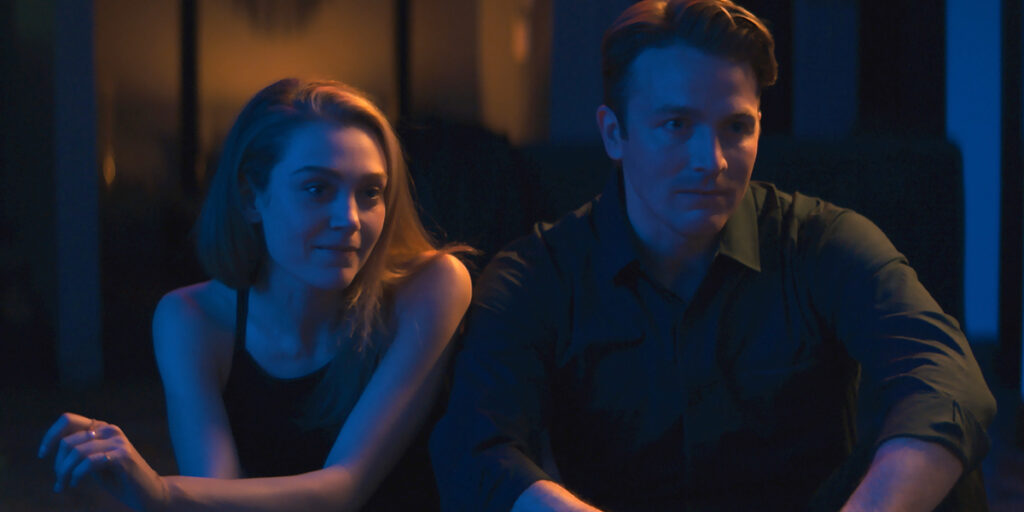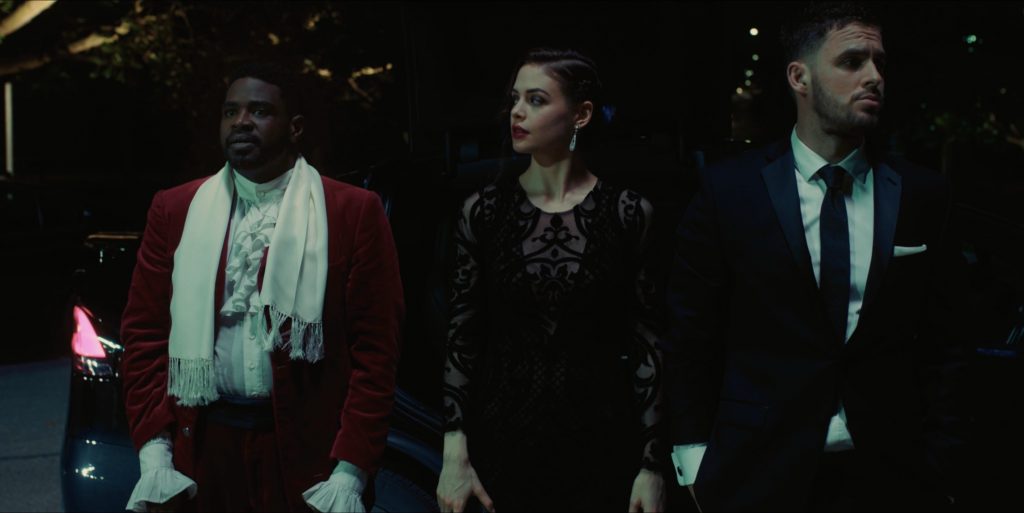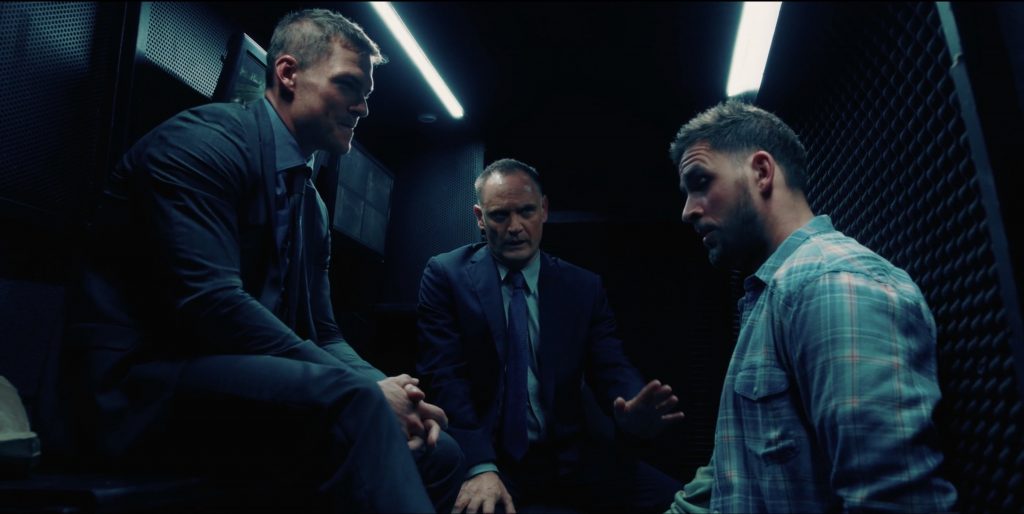April 16, 2022
by Carla Hay

Directed by Blaine Thurier
Culture Representation: Taking place in the Canadian city of Sudbury, Ontario, the horror film “Kicking Blood” features a nearly all-white cast of characters (with one black person) representing the working-class and middle-class.
Culture Clash: A female vampire becomes romantically involved with an alcoholic man, and she has inner conflicts over whether or not she should continue to hunt humans for their blood.
Culture Audience: “Kicking Blood” will appeal primarily to people who are interested in vampire movies, no matter how dull and misguided the movies are.

“Kicking Blood” tries to draw parallels between alcoholism and a vampire’s lust for blood, but this boring horror flick fails miserably as a scary movie and as an intended love story. Everything about “Kicking Blood” is done in such a half-baked and muddled way, it looks like the filmmakers and the cast members were confused about what type of movie they were really trying to do. The movie’s hackneyed screenplay, below-average acting and amateurish editing further sink “Kicking Blood” into the abyss where bad horror movies go and are quickly forgotten by anyone who had the misfortune of watching them.
Blaine Thurier directed “Kicking Blood” from a screenplay that he co-wrote with Leonard Farlinger. Overall, it’s supposed to be a horror movie, but there are no real scares. “Kicking Blood” tries to be a satire, but there’s nothing funny in the movie. It also wants to be a romance, but the central couple in the movie has no real passion or chemistry together. The entire movie plays out like a series of scenes that came from a sloppily conceived screenplay draft.
All of the movie’s characters are drab, with very little charm or appeal. “Kicking Blood” desperately wants viewers to root for the two main characters to get together as a romantic couple, but the entire movie does not answer these questions: “Why should these two egomaniacs be together in a dysfunctional relationship? Why should we care? Why was this movie even made?” The atrocious ending of “Kicking Blood” completely destroys the entire premise of what makes a vampire.
In the Canadian film “Kicking Blood,” a vampire named Anna (played by Alanna Bale) is leading a double life. By day, she’s a mild-mannered librarian in Sudbury, Ontario. By night, she’s a blood-sucking predator who’s always on the lookout for more human victims. Anna isn’t just part of the undead because she’s a vampire. She has a very dead personality too. In addition, viewers find out very little information about her background during the entire movie.
The movie gives a not-very-convincing explanation that Anna is able to function during the day, as long as she avoids sunlight. There’s a couple of scenes where Anna moves away from a window where sunlight is coming in through the window. However, the movie never explains what Anna does when she has to walk outside in the sunlight, which is inevitable since she has a day job and has to go to and from the building at some point. Unless she’s wearing a hazmat suit (which she does not do), some part of her skin is supposed to get burned by the sunlight.
“Kicking Blood” has a completely useless subplot about Anna’s library co-worker Bernice (played by Rosemary Dunsmore), an elderly woman who is Anna’s work friend and has several scenes in the movie. In the beginning of “Kicking Blood,” Anna witnesses a tension-filled conversation between Bernice and another co-worker named Gerry (played by Shaun Austin-Olsen), who’s about the same age as Bernice.
Gerry is giving Bernice a somewhat rude brushoff because he ended their recent fling, and her feelings are hurt. “You told me you loved me!” Bernice wails. Gerry replies haughtily, “It’s an expression, Bernice.” Before she storms off, Bernice then bitterly hisses at Gerry, “Go to hell!”
The next thing you know, Anna has shown up unannounced at Gerry’s home, where he finds her lounging on his living room couch. This movie is so badly written, Gerry doesn’t seem concerned or curious to find out how Anna got into his home without his knowledge. All Gerry seems to care about is that Anna took up his offer to come over to his place for a drink.
Because Anna is a vampire, Gerry finds out the hard way that the drink Anna really wants is blood from his neck. “This is for Bernice,” Anna smirks as she grabs Gerry by the neck to feed on his blood. Throughout the movie, Anna’s targets for bloodsucking are men who behave badly. If it’s supposed to make Anna look like some kind of feminist, “Kicking Blood” pathetically misses the mark.
That’s because the “bad boy” whom Anna spares from becoming her next victim—because the movie has her fall in love with him—is an alcoholic loser who’s awful to almost everyone around him. His name is Robbie (played by Luke Bilyk), who is the epitome of being a toxic train wreck. “Kicking Blood” doesn’t give very many reasons to root for Robbie and Anna to become a couple. Separately and together, Anna and Robbie are just a mess with no charm or redeeming qualities.
Viewers first see Robbie waking up on his sister’s couch after a night of drunken partying. The place is in shambles, with empty liquor bottles everywhere. Robbie has been temporarily living with his sister Angela (played by Telysa Chandler), and he is clearly an inconsiderate house guest. Robbie is woken up by Angela, who is pregnant and furious with Robbie. And it’s not just because of his partying that’s left her home in disarray.
Angela reminds Robbie that at this party, Robbie had a kissing makeout session with Angela’s fiancé, who is not seen in the movie. Robbie was so drunk that he only has a vague recollection of this loathsome betrayal, but he thinks it’s kind of funny. Angela isn’t amused at all, and she tells Robbie he can no longer stay at her place, effective immediately. It’s mentioned in this scene that Robbie has been in rehab before, but he’s obviously relapsed.
Robbie is next seen loitering in an alley at night because he’s now homeless. And guess who just happens to walk right past him? It’s Anna, probably on her way to find her next victim. This is the terribly written “meet cute” moment in the movie: As she walks past Robbie, he yells out to her: “Where do we go when we die?”
Anna stops and replies, “I have no idea.” Robbie then tells Anna, “I think it’s time for me to end it”—as in commit suicide. Anna seems unbothered by this confession and says flippantly, “Do it then.” Then she adds sarcastically, “I absolve you of your sins.”
Because this physically attractive woman is paying attention to him, Robbie suddenly doesn’t have “suicidal thoughts” anymore. He tries to flirt with her and asks Anna, “What are you doing tonight?” Anna says, “I don’t know.” Robbie replies, “Sounds fun. Can I come?” Anna nonchalantly replies, “Up to you.”
And then, Robbie follows her and ends up staying at her place, but they don’t hook up right away. As Anna crudely puts it: “I don’t fuck humans.” This is the kind of junk dialogue that litters the entire movie. There’s nothing funny or interesting about anything these characters have to say to each other, even though it’s obvious that the filmmakers want to bring dark comedy elements to “Kicking Blood.”
Anna quickly finds out that Robbie is an alcoholic when their first date takes place in a bar. Robbie just as quickly finds out that Anna doesn’t drink alcohol. For much of the movie, Anna treats Robbie as a house guest she’s reluctantly allowed to stay at her place. It’s pretty obvious though that she has feelings for him because she never bites him to get his blood. She comes close to sucking the blood out of him, but she changes her mind.
Even though Anna comes right out and tells Robbie that she’s a vampire, he doesn’t quite believe her. He just thinks she’s a wild eccentric who drinks blood and has convinced herself that she’s a vampire. Robbie doesn’t actually think that Anna has vampire characteristics, such as never outwardly aging or never needing to eat food. By the way, “Kicking Blood” doesn’t say how long Anna has been a vampire, which is one of many examples of how the character’s backstory is non-existent.
Anna has two vampire friends who often hunt humans with her. Their names are Boris (played by Benjamin Sutherland) and Nina (played by Ella Jonas Farlinger), who are the very bland “villains” of the story. Boris and Nina can’t understand why Anna hasn’t made Robbie one of her victims. They think that Anna is going “soft” because Boris and Nina have a lot of contempt for humans.
Meanwhile, Robbie has an ex-fling named Vanessa (played by Vinessa Antoine), who has lingering feelings for Robbie and tries not to let it show to him that she’s kind of jealous that he’s met someone new. Robbie has definitely put Vanessa in the “friend zone,” but she keeps dropping hints that she wants to rekindle whatever relationship that they had. When Vanessa finds out that Robbie doesn’t have a permanent home, she goes as far as telling Robbie that he’s welcome to stay at her place. It’s a very weak attempt by “Kicking Blood” to introduce some sort of love triangle.
“Kicking Blood” gets its title from the part of the story where Anna decides that she could stop being a vampire and turn back into a regular human being if she abstains from drinking blood. And it’s around the same time that Robbie decides to kick his addiction to alcohol. There’s an unnecessary plot development where Anna’s library co-worker Bernice announces that she stopped her habit of popping pills, so she’s on this self-rehab journey too.
What does all of this mean for “Kicking Blood”? Nothing except a lot of tedious scenes where Anna is torn between continuing her vampire lifestyle with Boris and Nina, or starting a new life with Robbie as they try to kick their “addictions” together. It’s a fairly good concept, but it’s bungled badly in “Kicking Blood,” which has a ridiculous and horribly edited showdown near the end of the movie. It’s ironic that this shoddily made vampire film sucks all the life out of what could have been an intriguing story.
XYZ Films released “Kicking Blood” in select U.S. cinemas, on digital and VOD on March 31, 2022. The movie is set for release on Blu-ray and DVD on May 17, 2022.


